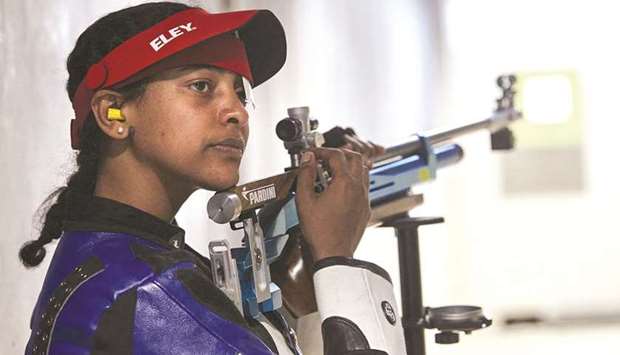When Eritrean refugee Luna Solomon lifts her rifle at a Lausanne shooting range, she is aiming at a specific target: a spot at the Tokyo Olympics in July.
Back in her home country, which has one of the worst human rights records in the world and has endured lengthy wars, the presence of a rifle would have meant life-threatening danger.
“In my country, if you’re shooting, it’s to kill someone,” Solomon told Reuters during a break in training for her event, the 10m air rifle.
“We don’t use rifles for sport.”
Solomon, 27, fled Eritrea and arrived in Switzerland in 2015. She took up the sport after meeting Niccolo Campriani, an Italian Olympic gold medallist and former world champion, who is now her coach.
She is one of a few dozen refugee athletes who are Olympic hopefuls, supported by the International Olympic Committee (IOC) to form a team to participate in this summer’s Games.
The IOC unveiled its first refugee team at the 2016 Rio de Janeiro Olympics in an effort to raise awareness of asylum issues. That year, more than a million refugees entered Europe after fleeing wars in the Middle East, Africa and central Asia.
The 10 members, from Syria, Congo, Ethiopia and South Sudan, competed in athletics, swimming and judo.
The sight of the refugees taking part in the traditional athletes’ parade was one of the most moving moments of the opening ceremony, and their progress at the Games became a global feel-good story. This year, some 55 refugee athletes from 13 countries, including Solomon, have been identified in a pre-selection for the Tokyo Games, with the final squad to be announced in June.
Eritrean runner Habtom Amaniel, 31, is also on the shortlist, hoping to compete in the 10 km event. In the safety of his training facility in Switzerland, he feels liberated to be ambitious.
“Here in Switzerland, I had chances I did not have in my country,” said Amaniel, who undertook a dangerous journey through Sudan and Libya before making it to Italy and eventually Switzerland.
“Here I can do whatever I want, and how I want. No one is telling me ‘you cannot do that, you have to do that’.”
His coach, Cyrille Gindre, attributes Amaniel’s focus and dedication to the hardships he has endured.
“He left without money, he had nothing, he had to cross the desert, he had no water. (He had to work out) how to cross the sea,” Gindre said.
“I think this is why he has so much willpower. Like a lot of people who lived in those places, everything looks brighter and this is what we see in his journey.”

Luna Solomon of Eritrea, hoping to make the Refugee Olympic Team in the 10m air rifle competition, pauses during a training session in Lausanne, Switzerland.
